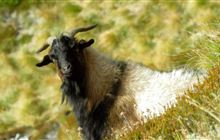Pirongia neighbours urged to collaborate with DOC on feral goats
Archived content: This media release was accurate on the date of publication.
Introduction
Landowners with properties adjacent to Pirongia Forest Park are being urged to contribute to a renewed effort to control feral goats.Date: 17 November 2022
As part of its Te Ara Ki Mua nationwide programme to manage wild animals, DOC has increased its investment in controlling feral goats at Pirongia Forest Park – a nationally important conservation area in Waikato.
Senior Ranger Biodiversity Dion Patterson says the involvement of neighbouring landowners is crucial to controlling the feral goats within and around Pirongia Forest Park.
“We’re keen to engage with neighbours who support our efforts to control goats within Pirongia,” Dion Patterson says.
“We need buy-in and support from neighbouring landowners who’ll work alongside us and our contract hunters to get on top of these pests.”
Feral goats are a pest species and risk the long-term conservation effort at Pirongia. The animals will eat foliage or strip bark from most trees and plants and quickly destroy vegetation within their reach, including seedlings and saplings. They are known to be able to climb sloping branches and trunks to devour foliage directly from trees.
The surefooted animals can also negotiate steep crags and narrow ledges, where rare native plant species are found. Their presence in these locations prevents revegetation and contributes to erosion.
From a farming perspective, feral goats compete with livestock for grass.
Dion Patterson says DOC’s contract hunters are experienced and skilled professionals, and their work to control goats can be even more effective if they’re allowed access to and through private properties.
“Effective control also requires using professional hunters who can seek out goats wherever they are. This requires cooperation from landowners to allow the hunters to remove all the goats from the surrounding area, preventing the pests from reinvading,” he says.
“Our professional hunters will work with landowners to tailor goat control operations to work in with farm operations.”
Dion Patterson says DOC also wants to understand who among neighbouring landowners farm goats or keep the animals as domestic pets, so the distinction can be made from the feral animals causing damage in the forest park. It is legal to farm goats, but they must be effectively contained and marked for ownership identification purposes.
DOC staff can make in-person visits to landowners to discuss goat management and collaboration to allow access for contracted hunters.
Landowners with property adjacent to Pirongia Forest Park are urged to email waikato@doc.govt.nz to register their interest in supporting DOC’s feral goat control work.
Contact
For media enquiries contact:
Email: media@doc.govt.nz

